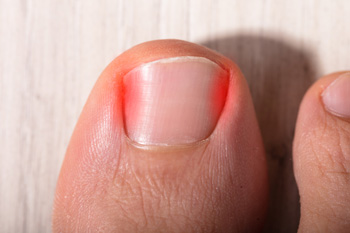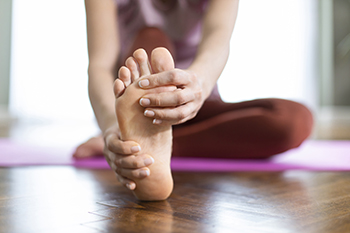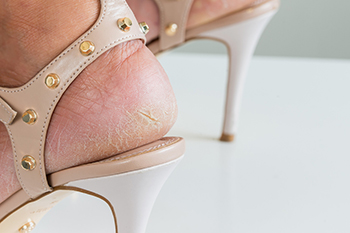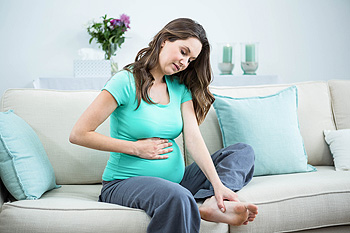Items filtered by date: July 2023
Understanding and Managing Pincer Nails

Pincer nails occur when the nail plate excessively curves, pinching the surrounding skin. They are also known as trumpet nails and are the most painful type of ingrown toenail. Unlike classic ingrown toenails, which affect one side of the big toe, pincer nails can develop on any toenail and roll into the skin on both sides of the nail plate. This condition causes discomfort and can feel like a splinter or glass as the nail digs into the skin. If left untreated, it can lead to redness, tenderness, inflammation, and even infection. Pincer nails can be caused by genetics, tight shoes, and improper toenail cutting. The elderly and pregnant women are more prone to this issue. Relief can be achieved by straightening the toenail, and in some cases, surgery may be necessary. If you are experiencing pincer nails, it is strongly suggested that you seek treatment from a podiatrist.
Ingrown toenails can become painful if they are not treated properly. For more information about ingrown toenails, contact Dr. Kevin Davis of Davis Foot & Ankle Centers. Our doctor can provide the care you need to keep you pain-free and on your feet.
Ingrown Toenails
Ingrown toenails occur when a toenail grows sideways into the bed of the nail, causing pain, swelling, and possibly infection.
Causes
- Bacterial infections
- Improper nail cutting such as cutting it too short or not straight across
- Trauma to the toe, such as stubbing, which causes the nail to grow back irregularly
- Ill-fitting shoes that bunch the toes too close together
- Genetic predisposition
Prevention
Because ingrown toenails are not something found outside of shoe-wearing cultures, going barefoot as often as possible will decrease the likeliness of developing ingrown toenails. Wearing proper fitting shoes and using proper cutting techniques will also help decrease your risk of developing ingrown toenails.
Treatment
Ingrown toenails are a very treatable foot condition. In minor cases, soaking the affected area in salt or antibacterial soaps will not only help with the ingrown nail itself, but also help prevent any infections from occurring. In more severe cases, surgery is an option. In either case, speaking to your podiatrist about this condition will help you get a better understanding of specific treatment options that are right for you.
If you have any questions please feel free to contact our office located in Springfield, TN . We offer the newest diagnostic and treatment technologies for all your foot and ankle needs.
What Causes Stiffness in the Big Toe?

The joint where the big toe connects to the foot is called the hallux. When this joint becomes stiff, it not only limits the ability to walk but also can become quite painful. This condition, termed hallux limitus, can result in arthritis and bone spurs. A callus may develop under the toe joint, and numbness and tingling may occur if nerves touch the bone spurs. Other symptoms of hallux limitus can include pain in the toe joint that worsens when you walk or flex the toe, and limping may result. Hallux limitus is thought to be caused predominantly by wear and tear in the joint. In some cases, abnormal foot structure, such as when the second toe is longer than the big toe, can possibly cause this condition. Wearing high heels that add pressure to the big toe joint is another potential reason hallux limitus can develop. A podiatrist can examine the toe joint with an X-ray to determine the extent of the condition. In some cases, custom orthotics can be prescribed to help correct the condition. If your big toe joint causes pain, especially while walking, it is suggested that you make an appointment with a podiatrist.
Toe pain can disrupt your daily activities. If you have any concerns, contact Dr. Kevin Davis of Davis Foot & Ankle Centers. Our doctor can provide the care you need to keep you pain-free and on your feet.
What Causes Toe Pain?
Most severe toe pain is caused due to a sports injury, trauma from dropping something heavy on the toe, or bumping into something rigid. Other problems can develop over time for various reasons.
Toe pain can be caused by one or more ailments. The most common include:
- Trauma
- Sports injury
- Wearing shoes that are too tight
- Arthritis
- Gout
- Corns and calluses
- Hammertoe
- Bunions
- Blisters
- Ingrown toenails
- Sprains
- Fractures (broken bones)
- Dislocations
When to See a Podiatrist
- Severe pain
- Persistent pain that lasts more than a week
- Signs of infection
- Continued swelling
- Pain that prevents walking
Diagnosis
In many cases the cause of toe pain is obvious, but in others, a podiatrist may want to use more advanced methods to determine the problem. These can range from simple visual inspections and sensation tests to X-rays and MRI scans. Prior medical history, family medical history, and any recent physical traumatic events will all be taken into consideration for a proper diagnosis.
Treatment
Treatments for toe pain and injuries vary and may include shoe inserts, padding, taping, medicines, injections, and in some cases, surgery. If you believe that you have broken a toe, please see a podiatrist as soon as possible.
If you have any questions please feel free to contact our office located in Springfield, TN . We offer the newest diagnostic tools and technology to treat your foot and ankle needs.
Are You Suffering From Ingrown Toenails?
Ways to Combat Cracked Heels

Cracked heels, which are a common foot condition, are usually non-threatening but can become potentially serious. It is best to try to prevent cracked heels from developing in the first place. It is a good idea to examine your heels and if they begin to feel dry, apply moisturizer regularly. Also, if you gain weight, the pressure on the heels increases and calluses may form. Extra weight, quite common among pregnant women, expands the heel skin while walking and standing and can cause cracks to widen. Wearing sling-back shoes, sandals, or flip flops also may cause the heels to dry out. Dried and cracked heels also can be a problem for those with diabetes, which can diminish the moisture supply to the feet. If the cracked skin on the heels does not improve with daily foot care precautions, they may deepen into fissures or begin to bleed. This opening of the skin can invite bacterial or fungal infections. An antiseptic lotion may help to keep the area clean. If cracked heels become an ongoing problem, it is suggested that you make an appointment with a podiatrist who can examine the area, and determine the best course of treatment.
Cracked heels are unsightly and can cause further damage to your shoes and feet. If you have any concerns, contact Dr. Kevin Davis from Davis Foot & Ankle Centers. Our doctor can provide the care you need to keep you pain-free and on your feet.
Cracked Heels
Cracked heels appear unappealing and can make it harder for you walk around in sandals. Aside from looking unpleasant, cracked heels can also tear stockings, socks, and wear out your shoes. There are several methods to help restore a cracked heel and prevent further damage.
How Do You Get Them?
Dry skin is the number one culprit in creating cracked heels. Many athletes, walkers, joggers, and even swimmers suffer from cracked heels. Age and skin oil production play a role to getting cracked heels as well.
Promote Healing
Over the counter medicines can help, especially for those that need instant relief or who suffer from chronic dry feet.
Wear Socks – Wearing socks with medicated creams helps lock in moisture.
Moisturizers – Applying both day and night will help alleviate dryness which causes cracking.
Pumice Stones – These exfoliate and remove dead skin, which allows for smoother moisturizer application and better absorption into the skin.
Change in Diet
Eating healthy with a well-balanced diet will give the skin a fresh and radiant look. Your body responds to the kinds of food you ingest. Omega-3 fatty acids and zinc supplements can also revitalize skin tissue.
Most importantly, seek professional help if unsure how to proceed in treating cracked heels. A podiatrist will help you with any questions or information needed.
If you have any questions, please feel free to contact our office located in Springfield, TN . We offer the newest diagnostic and treatment technologies for all your foot care needs.
Common Foot Problems During Pregnancy

More than half of pregnant women experience some type of foot problem. Common ailments can include collapsed arches, swelling, cracked heels, and foot pain. Fallen arches are largely due to a weight gain and the release of a hormone called relaxin. This hormone, which relaxes the ligaments in the feet and ankles as well as other body parts, contributes to the appearance of flat feet. A common complaint during pregnancy is swollen feet, which is the result of a buildup of fluid in the lower extremities. Pregnant women are cautioned not to stand for long periods of time, and to keep their feet elevated as often as possible. Heel pain caused by an inflammation of the plantar fascia can be treated by wearing shoes that have more arch support and ample cushioning. Certain exercises can also help to reduce the symptoms. Hormonal changes during pregnancy can cause the skin to dry out, and as it becomes more difficult to reach the feet to keep them properly moisturized, cracked heels may develop. These can become painful and lead to infection if ignored. If you are experiencing any foot problems during pregnancy, it is suggested that you make an appointment with a podiatrist.
Pregnant women with swollen feet can be treated with a variety of different methods that are readily available. For more information about other cures for swollen feet during pregnancy, consult with Dr. Kevin Davis from Davis Foot & Ankle Centers. Our doctor will attend to all of your foot and ankle needs.
What Foot Problems Can Arise During Pregnancy?
One problem that can occur is overpronation, which occurs when the arch of the foot flattens and tends to roll inward. This can cause pain and discomfort in your heels while you’re walking or even just standing up, trying to support your baby.
Another problem is edema, or swelling in the extremities. This often affects the feet during pregnancy but tends to occur in the later stages.
How Can I Keep My Feet Healthy During Pregnancy?
- Wearing orthotics can provide extra support for the feet and help distribute weight evenly
- Minimize the amount of time spent walking barefoot
- Wear shoes with good arch support
- Wear shoes that allow for good circulation to the feet
- Elevate feet if you experience swelling
- Massage your feet
- Get regular, light exercise, such as walking, to promote blood circulation to the feet
If you have any questions please feel free to contact our office located in Springfield, TN . We offer the newest diagnostic and treatment technologies for all your foot and ankle needs.

